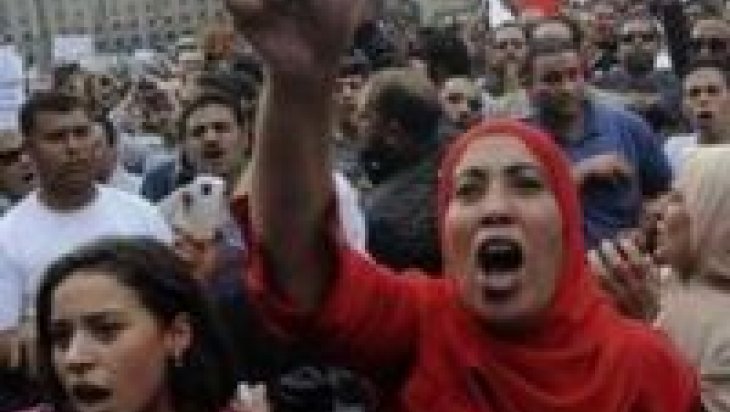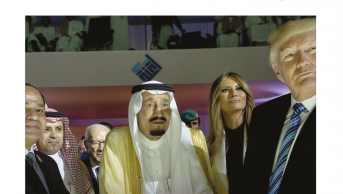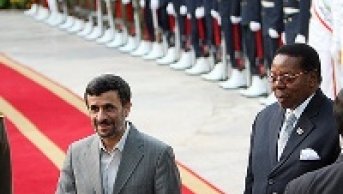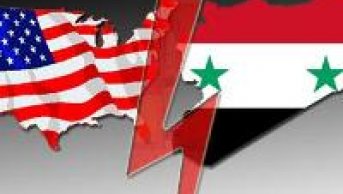After Revolution, Egypt, quo vadis?

It has been approximately two years since the Hosni Mubarak period came to an end through a major popular uprising on Jan. 25, 2011.
Mubarak, who was in power for the last 30 years, was removed from his seat by a large mass, including youth, liberals, leftists, Islamists and some other groups, through demonstrations they staged in various cities of the country, especially in Tahrir Square -- the symbol of the revolution. During the aforementioned process, different groups acted in unison to topple the Mubarak regime. However, after the removal of Mubarak from power, which was the common goal, revolutionist/opposition groups could not act in unison due to their different visions of Egypt.
The rising violence of the revolution that has been going on for the past two years draws a pessimistic picture. However, political history has shown us many times that revolutionary periods are not painless or non-violent. Namely, a revolution is not completed in a process like “passing from the shade into the sun.” The period of change in Egypt is no exception. The revolution required patience and decisiveness.
Even though the acts of violence in Egypt in the second year of the revolution are not good indicators for the future, the fact that important developments have taken place in the past two years should not be ignored. The Egyptian people, who are not exactly allowed to express their will, have been through three elections in which they could freely express their will for a year-and-a-half. In a short period of time Egyptians have been through a presidential election and a constitutional referendum.
In the revolution, anti-Mubarak revolutionary groups such as young activists, liberals and leftists having control over the streets, especially in Tahrir Square, could not show the same success in the election results. The Muslim Brotherhood, which is more organized and has a more powerful organizational structure, left its mark on all three ballot boxes. The Muslim Brotherhood, which did not even have a political party identity because it was banned until 2012, soon came into power in Egypt. It won the elections with 47.18 percent of the vote in the general elections. Mohammed Morsi, an important member of the Muslim Brotherhood, won the presidential elections held right after the general elections.
Although the Muslim Brotherhood was successful in the aforementioned elections, it cannot be suggested that it managed the revolution well. The clearest indicator of this is the fact that Tahrir Square, the anti-Mubarak symbol, became a place where anti-Morsi demonstrations were staged. Major mistakes by the Muslim Brotherhood, as well as the approaches and actions of other groups, play an important role in the emergence of the anti-Muslim Brotherhood movement.
The Muslim Brotherhood should not have lost the support of revolutionary groups both for Egypt’s and also its own future, but it did. The Muslim Brotherhood, which emerged in 1928, developed and grew stronger in time as an opposition movement and wanted to become official as soon as possible by taking advantage of the environment of a revolution. It joined the revolution late and left it early. As in the example of the army during the revolution, it cooperated with the former regime rather than with the revolutionary groups. Even though it was rational for it, it lost the trust of revolutionary groups. It preferred cooperating with the former regime while making a transition in Egypt.
Of course, the fact that it was successful in both elections and was supported by some important international powers made it possible for it to act freely. As a result, while the authorities of the former regime cooperated with the Muslim Brotherhood, they sided with anti-Morsi groups in the street. Today, the Muslim Brotherhood understands what it means to be in power. As a movement that saw the bad sides of the regime in the past, the Muslim Brotherhood should have correctly read the language of the street that is against Mubarak. What the people demand is not “religious change” but “political and economic change.” The Muslim Brotherhood should have understood this and should have acted accordingly. In this hard process, it should not have lost the support of revolutionary groups.
The Muslim Brotherhood, which achieved success in the general elections, first stated it would not nominate a candidate for the presidential elections, but it acted differently afterwards. The first division among revolutionary groups took place during the presidential election. Therefore, the Muslim Brotherhood suffered in this process, even though it won the presidential election. While the Muslim Brotherhood toppled Mubarak, it also grew apart from revolutionary groups with which it had joined forces in Tahrir. Revolutionary groups comprising young activists, liberals, leftists and nationalists accused the Muslim Brotherhood of betraying the revolution. They accused President Morsi of being authoritarian, of having all power in his hand, and of working to spread the Muslim Brotherhood mentality in Egypt.
The developments currently taking place in Egypt can by no means be attributed only to the failure of the Muslim Brotherhood to manage the process. The fact that revolutionary forces such as liberals, leftists and nationalists, which are active in the streets -- especially in Tahrir Square during the revolution, failed in the elections led to the emergence of new anti-Muslim Brotherhood groups in Egypt.
The National Salvation Front, formed under the leadership of Mohammed ElBaradei and Amr Moussa, who took office in important positions in the former regime, served in high-level positions in regional and international institutions and who became a candidate in the presidential election, puts Morsi in a difficult position at certain points. During violent events in the second year of the revolution, they did not give a positive response to calls for dialogue from the Morsi front. In a sense, they want to take advantage of the instability and people pouring into streets, and to take part in the administration. They strive to have what they could not achieve in the elections by making use of the political instability. To do so, they mobilize the dissatisfied mass of people against the Muslim Brotherhood and pave the way for “illegality,” and Egypt drifts into an unmanageable process. The interesting part is that; while the former regime holders are backstage, there is a conflict/tension in Tahrir Square among the groups joining their forces against Mubarak, and the “established order” of Egypt has the chance to perpetuate its existence in this process.
Transforming and ruling a country with a population of 84 million that does not have a democratic background and a strong economy is by no means easy. What is important in this process is to healthily maintain the transition process. There are major obstacles before the Muslim Brotherhood that is in power. Whether it can establish a “democratic order” and “sustainable development,” which are the general demands of the mobilized mass of people, or not, is important in terms of the future of the Muslim Brotherhood, Egypt and of the region. But it seems that this process will not be easy. Countries in the region, other countries and some internal groups that would like to be effective in the new Egypt wish to use the process for their own interests. Thus, the Muslim Brotherhood needs to manage the process very well by taking all the developments into account. For a successful transition in Egypt, it is crucial both to draw internal groups into the political system and also to provide external support. Running a country with huge domestic, external and economic problems is way beyond running a group.









